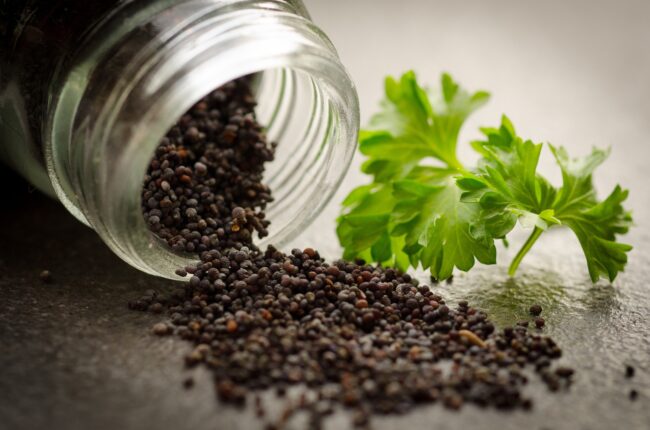Table of Contents
Let’s just say it. No, poppy seeds are not safe for dogs. In fact, they are toxic for pets. But what happens if your dog accidentally ingests poppy seeds?
While a small amount may not lead to adverse effects, a larger amount of poppy seeds can turn out to be fatal. Even a smaller amount can be dangerous for a small dog.
Poppy seeds contain opiates that are extremely dangerous for dogs. Opiates are sedatives that are harmful to humans when taken in excess. For dogs, even little can be dangerous. Therefore, as a pet parent, you must avoid feeding anything containing poppy seeds to your dog.
This article explains why dogs cannot eat these seeds, the symptoms of poppy seed poisoning, and what you can do to help your dog.
Poppy Seeds Are Toxic!
The toxicity of poppy seeds depends on the amount ingested. A larger intake can lead to poisoning but even a small amount can be dangerous for a smaller dog.
According to Pet Poison Hotline and Prevention of Cruelty to Animals (ASPCA), poppy seeds are poisonous to dogs.
Regardless of how much has been ingested, it is important to visit the vet when your dog has accidentally consumed poppy seeds. Remember, there is no “safe” limit when it comes to poppy seeds. Unlike other food items, there is no moderate value. Any amount can trigger a toxic reaction.
Why Are Poppy Seeds So Toxic?
Poppy seeds contain opiates which are toxic for dogs. Opiates, if ingested, can attack the dog’s nervous system.
Poppy seeds belong to the category of food items that should be avoided at all costs. Even a moderate amount can be dangerous. Different dogs may react differently – after consumption, some might appear extremely energetic while others may appear sedated.
Drunken walking is another symptom of poppy poisoning. Sometimes, the dogs behave unusually and do not remember their owners. One may also notice seizures in bad cases. If not treated in a timely manner, poppy poisoning may lead to death.
Symptoms Of Poppy Poisoning
Poppy poisoning is dangerous, and you should look out for signs that may indicate that your dog has eaten these seeds. Here are common symptoms to look out for.
- Breathing difficulties
- Slower heart rate
- Appearing drowsy or drugged
- Lack of activity
- Seizures
- Pinpoint pupils
- Constantly staring, “beady” eyes
- Trembling
- Ataxia (loss of control over bodily movements)
When you notice any of these symptoms, visit the vet immediately for treatment. Remember that poppy poisoning can have fatal consequences. Speedy action can literally save your pet’s life.
You may hear that small amounts might not harm the dog but rather, don’t leave things to chance. Even if you’re not sure how much or how little your dog has eaten, take it to the vet for treatment.
Safety Tips
- First, keep poppy seeds well away from your dog’s reach. It is better to prevent it from happening in the first place. Store such food items in places where it is not accessible by dogs.
- Even if you are not sure that your dog actually ate the poppy seeds, keep a watch for at least 48 hours for any symptoms.
- Do not keep poppy plants around the house or garden.
- If you know your dog has consumed poppy seeds, schedule a visit to the nearest vet as quickly as possible.
Diagnosis
Upon taking your dog to the veterinarian, here’s how the vet may treat the pup. First, a physical exam of your dog will be conducted and the vet will ask you questions about which food item contained the seeds and possibly how many the dog might’ve eaten.
A complete blood count will provide information on how internal organs are functioning. Packed cell hydration may be performed. Urinalysis may also be done to analyze kidney health. The veterinarian may also decide to do an ECG if the heart rate appears abnormal.
Poppy Poisoning Treatment
Your vet may empty the dog’s stomach by inducing vomiting. This is something you should never try at home. The veterinarian knows how to do this procedure safely.
In case of breathing difficulties, the dog may be placed in an oxygen cage. If the dog is feeling lethargic, depressed, or has dilated pupils and staring eyes, then the vet may keep the dog in a dark, quiet place.
Medications may also be given to prevent complications.
A Final Word
Poppy seeds are not safe for dogs. They are, in fact, extremely toxic. In the worst-case scenario, it may lead to death.
Appears frightening? Well, it is. Even the symptoms of poppy poisoning are scary. Your furry friend may feel lethargic, depressed, walk around drunkenly, fail to recognize you, or not eat anything. It may even lead to seizures.
Thus, if you notice any symptoms, make an immediate trip to the vet. We would recommend preventing such calamity in the first place. This could be done by not planting poppy plants in your garden and by keeping poppy seeds in the kitchen out of your dog’s reach.

